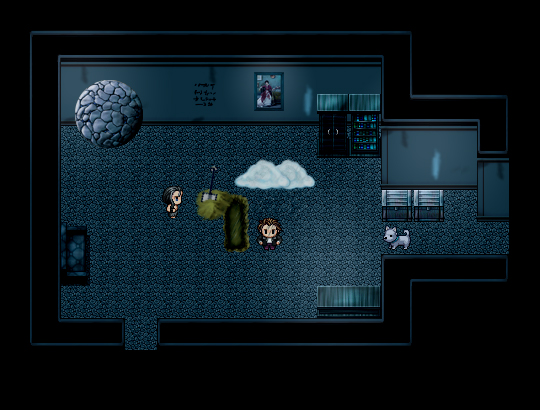Even the best of us have something hidden within ourselves or our past we prefer to keep buried. The monsters of self-pity, jealousy, bitterness, and anger are always battling with our better self. For some, these inner demons can be just as dark as any denizens of Hell. Later On focuses on what it might be like if the murky recesses of the mind found their way out into a reality of their own.
Later On Review [PC]
You play as David, an individual who clearly has a less than lacklustre view of the world and the people in it. David often refers to people as “trash” as he makes his way around the neighbourhood. It is clear from the get-go that something is a little off about the town of Later On, and David seems a little too calm about it. For example, your daily routine involves disappearing into the back of a . . . research facility? Lab? Whatever it is, it has something to do with David’s “job”, and whatever that might involve doesn’t sound good based on the noises coming from the back area. Of course, David shows no sign that any of this is bizarre or out of place.
After “work” David runs into a friend, Nico, an ally complaining he needs David’s help because he just developed a tail. David isn’t quite certain how to assist, so he decides to do nothing and walk away. This decision to abandon his friend in a time of need sets off the game’s events as David attempts to make things right with Nico. But, this is only the beginning of David’s deep dive into his own motives. What kind of person is he? And if the world around is any clue, David has some skeletons in his closet that are going to be something much worse than that time you got drunk at Christmas no one prefers to talk about.

Later On does well in sustaining a sense of unsettling anticipation. In part, this is accomplished by well-placed and well-orchestrated sound effects and music. Another way is through an unpredictable narrative. Whether you are tasked with finding a mermaid or encouraging a sentient towel to allow you to pull it off the wrack, you never know what might come around the corner. When the game takes its darker turns, this unpredictability feels even more disquieting because it appears to be a normal aspect of David’s life. Environments take on a bloody hue at times and monsters present themselves as if they are a natural part of the everyday. Dreamlike conversations with fellow residents who seem totally at home in nightmarish situations only add to the unease.
Puzzles are usually simple and equally as surreal, requiring you to think about objects around you in a way that is contrary to their natural use. For example, you might have to utilize a painting as if it were a certain appliance, or figure out how to awaken a sleeping manhole cover so you can move it. In these instances, some trial and error along with just a little ingenuity are enough to find the solution. But, there are also instances where the game sends you on a hunt for an object without any clue where to locate it. In one case, I needed to find something to cut down some bushes that were blocking my progress. I wandered around town until I found it in a location that felt random rather than a natural place to seek them out. These situations made the puzzles feel a bit inconsistent.
There are only a couple of what might be called “boss battles” in Later On, and though these were clearly meant to serve as emotional epiphanies for David, I found them the least enjoyable interactions in the game. You are confronted by a monster that represents an aspect of David’s past or character that he wishes not to face. You are challenged with accusations to which David must respond accordingly by choosing from a set of replies.
For example, you will run into a monster of self-pity who can only be defeated if David responds in ways contrary to that emotion. However, there were times when the exact meaning of a sentence is not quite clear, so I had to guess which one would cause a blow to my enemy. If you guess wrong, you still have to complete the interaction only to fail and go through the whole thing once more. It also felt lacklustre as a tool for making me empathize with David. From the world around him and some of the later story elements, I began to understand just how disturbed David was, but I never felt close to David. This made having to try to answer questions as him a rote effort, particularly at the very beginning.

The characters around David feel charming and full of life. In fact, it is everything around David that gives the world both its vibrancy and horror. David himself is simply a vessel often removed and unaffected, which is fine and fitting, except when we are asked to get into his head and pretend to be him. It is for this reason that Later On doesn’t quite hit its mark as an emotional narrative that wants the player to connect with David in a rather visceral fashion. The horror is conveyed just the same, and perhaps natural empathy can help bridge the disconnect between David’s story and the player, but I left without ever feeling a strong sense of attachment when it seems clear the game intended that I should.
David’s story isn’t quite original. A number of indie horror titles have dealt with taking on the role of a protagonist whose mind has seriously affected their perceptions of the world around them. Home does this quite well and far more subtly.
Later On is available now on Steam.
